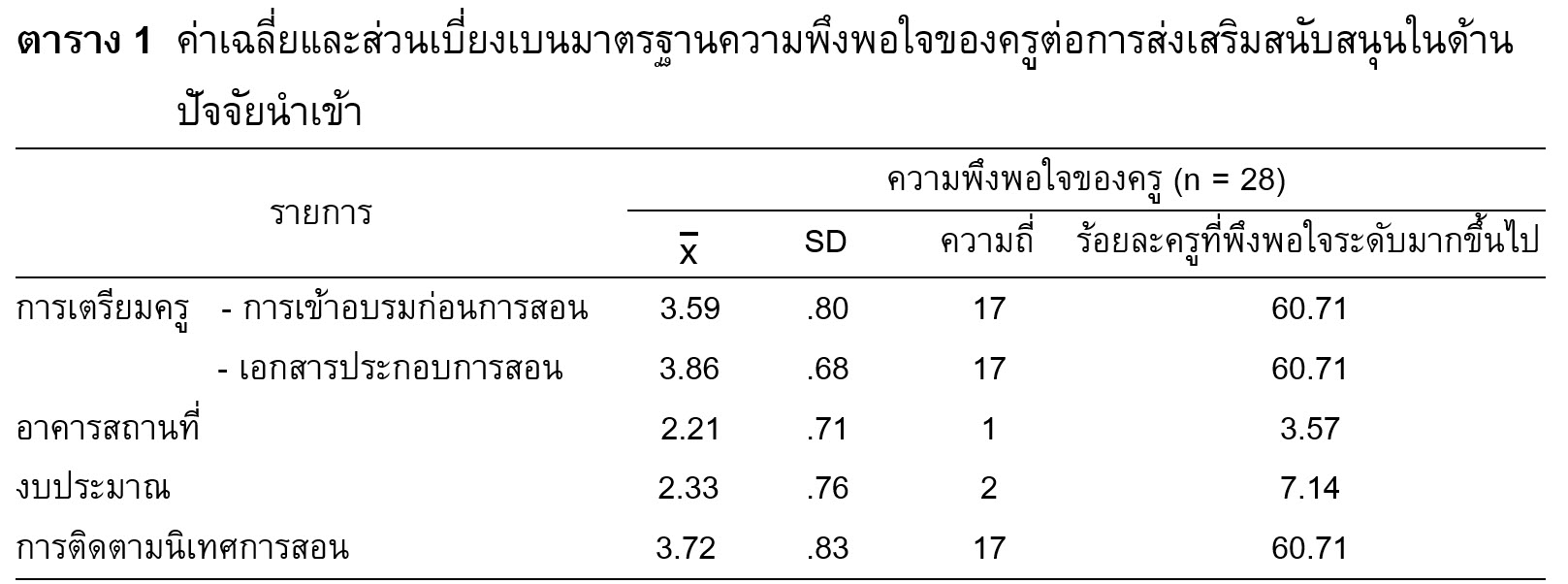การติดตามการใช้หลักสูตรการศึกษาขั้นพื้นฐาน ค.ศ. 2010 สาระวิทยาศาสตร์ ชั้นมัธยมศึกษาตอนต้น ของโรงเรียนในอำเภอสังทอง นครหลวงเวียงจันทน์
Main Article Content
Abstract
Seethong Parchaixiong, Porntip Chaiso and Pattamaporn Pimthong
รับบทความ: 15 กรกฎาคม 2559; ยอมรับตีพิมพ์: 24 ตุลาคม 2559
บทคัดย่อ
การวิจัยครั้งนี้มีวัตถุประสงค์เพื่อติดตามการใช้หลักสูตรการศึกษาขั้นพื้นฐาน ค.ศ. 2010 สาระวิทยาศาสตร์ ชั้นมัธยมศึกษาตอนต้น ของโรงเรียนในอำเภอสังทอง นครหลวงเวียงจันทน์ โดยใช้วิธีการประเมินเชิงระบบเกี่ยวกับความเหมาะสมด้านปัจจัยนำเข้า ด้านกระบวนการ และด้านผลผลิต กลุ่มผู้ให้ข้อมูล คือ ผู้บริหารโรงเรียน 5 คน หัวหน้ากลุ่มสาระวิทยาศาสตร์ 5 คน ครูสอนวิทยาศาสตร์ 23 คน และนักเรียน 788 คน เครื่องมือที่ใช้ในการรวบรวมข้อมูล ได้แก่ แบบสัมภาษณ์ แบบสอบถาม แบบสังเกต และแบบวัดเจตคติต่อวิทยาศาสตร์ ใช้การวิเคราะห์ ความถี่ ร้อยละ ค่าเฉลี่ย ส่วนเบี่ยงเบนมาตรฐาน และการวิเคราะห์เนื้อหา นำผลการวิเคราะห์มาเทียบกับเกณฑ์ที่กำหนดไว้ในแต่ละด้าน เพื่อพิจารณาถึงความเหมาะสมของการใช้หลักสูตร ผลการวิจัยพบว่า 1) ด้านปัจจัยนำเข้า มีความพร้อมในเรื่องการเตรียมครูโดยครูส่วนใหญ่ได้รับการอบรมแนวทางการใช้หลักสูตร และได้รับเอกสารประกอบการใช้หลักสูตร ผู้บริหารส่งเสริมให้ครูพัฒนาตนเองและชุมชนให้ความร่วมมือกับโรงเรียน ปัญหาที่พบคือ ครูวิทยาศาสตร์ไม่เพียงพอ โรงเรียนต้องใช้ครูคณิตศาสตร์มาสอนวิทยาศาสตร์ ขาดแคลนงบประมาณเพื่อซื้อวัสดุอุปกรณ์ใช้ในการเรียนการสอนวิทยาศาสตร์ ไม่มีห้องทดลอง ขาดการติดตามนิเทศการสอนของครูอย่างต่อเนื่อง 2) ด้านกระบวนการจัดการเรียนการสอน ครูส่วนใหญ่มีการเตรียมแผนการสอน แต่ยังใช้การสอนแบบบรรยาย มีการใช้สื่อในระดับน้อย และการให้ผลย้อนกลับกับผู้เรียนอยู่ในระดับปานกลาง 3) ด้านคุณภาพของผลผลิต ผู้เรียนส่วนใหญ่มีผลการเรียนอยู่ในระดับปานกลาง นักเรียนส่วนน้อยมีส่วนร่วมในกิจกรรมการเรียนการสอน มีนักเรียนที่มีเจตคติต่อวิทยาศาสตร์อยู่ในระดับสูงเพียงร้อยละ 17.64 ข้อเสนอแนะจากการวิจัยนี้คือ ผู้รับผิดชอบในการใช้หลักสูตรวิทยาศาสตร์ ควรให้การสนับสนุน อย่างยิ่งต่อการพัฒนาครูวิทยาศาสตร์ การจัดครูวิทยาศาสตร์ให้เพียงพอ และการจัดสรรงบประมาณทั้งในส่วนของอุปกรณ์การเรียนและห้องเรียนวิทยาศาสตร์
คำสำคัญ: การติดตามการใช้หลักสูตร หลักสูตรการศึกษาขั้นพื้นฐาน ค.ศ. 2010 สาระวิทยาศาสตร์ โรงเรียนในนครหลวงเวียงจันทน์
Abstract
The aim of this study was a follow-up study on the implementation of the Science Curriculum, A.D. 2010 Basic Education in Sungthong District secondary schools, Vientiane Capital. The study employed the systematic evaluation for the appropriateness of inputs, process, and output. The collecting data from 5 secondary schools comprised of 5 school administrators, 5 head of science teachers, 23 science teachers, and 788 students. The instruments were Interview form, questionnaires, observation form, and attitudes towards science scale. The data were analyzed by frequency, percentage, mean, standard deviation, and content analysis method. Comparing data with specified criteria in each topics were used for interpretation data. The research results were found in three aspects. 1) The input factors, there were appropriate with teacher preparation, teachers training and providing curriculum documents. The school administers have supported teachers to self-development and encouraged school community cooperation. The problems were shown that lack of science teachers and providing mathematics teachers instead, the limitations of budget in sciences laboratory and equipment and lack of continuously in teacher teaching supervisions. 2) In the part of instructional process, most teachers prepared their lesson plans but still teaching in lecture method. There was a certain extent by using in learning media. Some teachers always focused on assessment by using feedback at moderate level. 3) The quality of output, most students had academic performance at moderate level. There were slightly students to participate in teaching and learning activities. Around 17.64% of students had attitudes towards science at high level. In the suggestions of this study, school administrators should develop competencies of science teachers continuously and should provide sufficient budget for science instructions such as science lab and equipment.
Keywords: Follow-up study on curriculum implementation, The A.D. 2010 Basic Education Curriculum, Science subject, Vientiane capital school
Downloads
Article Details

This work is licensed under a Creative Commons Attribution-NonCommercial 4.0 International License.
References
Aydeniz, M., and Kotowski, M. (2014). Conceptual and methodological issues in the measurement of attitudes towards science. Electronic Journal of Science Education 18(3): 24.
Chookhampaeng, C. (2010). Curriculum De-velopment: Development, Management, Evaluation and Research. Mahasarakham: Mahasarakham University Printing House. (in Thai)
Department of Secondary School. (2014). Report of Implementation on Final Examination of Lower Secondary School which Agreement of Whole Country on Annually 2013–2014. Retrieved from http://www.moe.gov.la/index.php/lang-la/public cations, June 28, 2014. (in Lao)
Laohapakdee, P. (1997). Guidelines for Teaching Science. Bangkok: Thai Watana Panich. (in Thai)
Ministry of Education and Sport. (2008). Education Law of Lao People Democratic Republic (New Updated). Vientiane Capital: Education Printing House. (in Lao)
Ministry of Education and Sport. (2008). Strategy to Reform National Education. Vientiane Capital: Sisavath Printing House. (in Lao)
National Research Council [NRC]. (2000). Inquiry and the National Science Education Standards. Washington, D.C: Author.
Pitiporntapin, S (2015) Learning Science and Society of the 21st Century. Bangkok: Neva Education. (in Thai)
Pitiyanuwat, S. (2015). Summary of Journal for Evaluation Project. 9th ed. Bangkok. Chulalongkorn University. (in Thai)
Research Institute for Science Education. (2010). Science Curriculum A.D. 2010 Basic Education Secondary School. Vientiane Capital: Education Printing House. (in Lao)
Research Institute for Science Education. (2011). Manual of Basic Implementation of Science Curriculum. Vientiane Capital: Education Printing House. (in Lao)
Sherman, S. (2004). Science and Science Teaching method for Integrating Technology in Elementary and Middle Schools. Boston: Hounghton Mifflim.
Sinlarat, P. (2014). Ideally Analysis of Teaching and How to building. Bangkok: Chulalongkorn University. (in Thai)
Institute for the Promotion of Teaching Science and Technology [IPST]. (2012). Science Teacher Professional Approach to Teaching Effectiveness. Bangkok: Intereducation Supplies. (in Thai)
Thumthong, B. (2011). Curriculum Development. 4th ed. Bangkok: Chulalongkorn University. (in Thai)
Wiersma, W, and Stephen, G. (2009). Research Methods in Education. 9th ed. Boston: Allyn and Bacon.
Yamane, T. (1967). Elementary Sampling Theory. Englewood Cliffs, N. J.: Prentice Hall.
